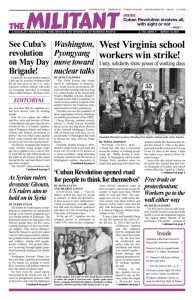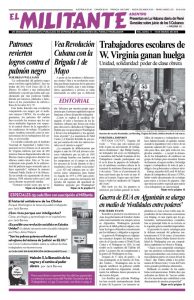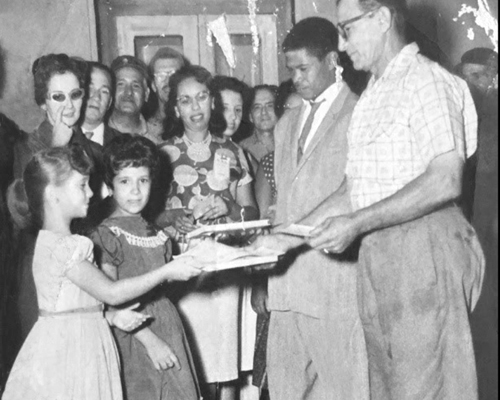KNOXVILLE, Tenn. — “Our revolution opened the road for people to advance, to think for themselves, to have access to more information,” Cuban revolutionary Griselda Aguilera told some 30 students, professors and others at a Feb. 19 meeting at the University of Tennessee here.
At the age of 7, Aguilera was the youngest person to participate in Cuba’s 1961 mass literacy campaign. Some 250,000 volunteers, many of them teenagers, spread out across the country to teach more than 700,000 adults to read and write. The campaign was one key result of the historic victory won when workers and farmers, led by Fidel Castro and the July 26th Movement, overthrew the U.S.-backed Fulgencio Batista dictatorship on Jan. 1, 1959.
“It was a huge and beautiful thing we did. We answered the call by Fidel. By Dec. 22, 1961, Cuba was free of illiteracy,” Aguilera said. She explained how the campaign had other important results — “for the first time the countryside was united with the city, and blacks and whites were united together.” Racist attitudes and regional prejudices began to be broken down by working together, she said.
Because of her age, Aguilera was assigned to stay in Havana, where she taught a 58-year-old street cleaner to read and write.
Meeting organizers showed the film “Maestra” (Teacher) by Catherine Murphy, who accompanied Aguilera to Tennessee. It features interviews with a number of those who participated in the literacy campaign, including Aguilera. The documentary shows how they were transformed by their experiences, becoming more disciplined, more revolutionary-minded and more confident to continue to fight to improve society.
Cuba took many of the lessons learned from the literacy drive and developed a special program, Yo si puedo (Yes I Can), Murphy told the meeting. Cuban volunteers have used it to combat illiteracy among adults in more than 30 countries across Latin America, Africa and elsewhere, especially in rural areas and among indigenous populations, like Aboriginal people in Australia.
Aguilera contrasted Cuba’s continuing solidarity with working people around the world — sending doctors and teachers to “help other countries in the fields of health care and education” — to the U.S. government, which carries out “many armed conflicts around the world.”
One woman who said she had visited Cuba, commented, “It seems like Cuba is getting more capitalistic. Would you say Cuba is in a postrevolution phase?”
Cuba has faced a continuous economic war by the U.S. government, Aguilera said. “In 1967 private property was eradicated in Cuba. But several years ago, we decided to allow self-employment which was necessary to deal with our economic challenges. But this also created contradictions as economic differences arose between workers in our factories and those who got into the private sector. The government is taking measures to keep this to a minimum.
“If this doesn’t work, we will try something else. We’re determined to keep the achievements of the Cuban Revolution,” she said. “North Americans can do a lot to support our revolution by working to get rid of the economic blockade.”
Samir Hazboun, who helped organize the Knoxville leg of Aguilera’s tour, encouraged those at the meeting to sign up for the May Day International Brigade to Cuba. “I urge you to see Cuba for yourselves and learn about the gains of the Cuban Revolution,” he said. Sixteen people signed up to find out more about the brigade during Aguilera’s three-day tour in Tennessee.
On Feb. 20 Aguilera spoke to two classes at Bearden High School, one composed of students who are native Spanish-speakers. They had a lively discussion, including asking her about Cuba’s medical and education systems. “My mom had to pay hundreds of dollars for a simple blood test here,” one student said. Others humorously begged Aguilera to take them with her back to Cuba.
Aguilera’s tour ended with a day at Pellissippi State Community College, where she spoke to some 75 students, teachers and others at two morning classes and an evening event.
“The literacy campaign broke the tradition in Cuba of women and girls staying at home,” Aguilera said at one of the classes. “We went out into the world for the first time, to areas with no electricity, no running water, no roads. So different than the life we were used to in the cities. We were converted from students to teachers!
“We showed we were capable of living and working with the field workers. This was a fundamental part of the literacy campaign — and it transformed the young people,” she said. “It wasn’t just the volunteers. The whole country was involved in the literacy campaign and helped with all aspects of it.”
There is still an organization of former literacy volunteers who meet together, Aguilera said. “We became and remain strong supporters of the revolution.”
“The literacy campaign was the first big campaign of the revolution,” she explained at the evening meeting. “It helped prepare Cuban workers and peasants for their responsibilities in running the country.”
From the beginning, the revolution made concerted efforts to develop the countryside and close the gap between conditions there and in the cities, Aguilera said. “We have built roads and bridges where there were none before. The homes of the peasants have improved. There is electrification throughout the country. We have created rural communities with schools, libraries, shopping centers, doctors and hospitals.”
“Education has been a priority of the revolution,” Aguilera said. “We may lack a lot of material things, but spiritually we are a very elevated country.”


